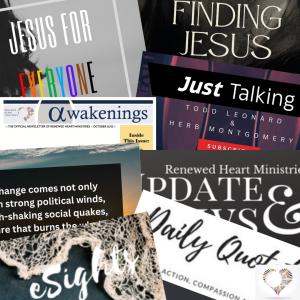
As we consider our consideration of the harmful myth of redemptive death, again, these are not insignificant theological difference between the gospels. These theologies have produced very different results in the lives of Jesus communities that emphasize one or the other.
Welcome Readers! Please subscribe to Social Jesus Here.
(Read this series from its beginning here.)
I want to say one brief word about this shift in John. Even when Jesus’ death becomes redemptive in the Johaninne Jesus community, this death is never punitive or at the hands of God. Jesus doesn’t die as our substitute in John. Even though Jesus’ death is redemptive in that gospel, it doesn’t fit very easily within Western Christian penal substitutionary theology. It fits more easily in other atonement theories that have been held by Christians throughout history, especially the Christus Victor paradigm (“now the prince of this world will be driven out.”) and the Moral Influence paradigm (when I am lifted up from the earth, will draw all people to myself). But John’s gospel never says that Jesus’ death is to satisfy justice or a God that needs someone to stand in the gap and be punished for everyone else. That explanation doesn’t show up at all as an explanation to why Jesus (the seed in our reading) must die.
But this doesn’t completely solve the problems. Even if we embrace a different explanation of why Jesus died than penal substitutionary atonement, those other explanations have still produced harmful fruit for people who have subscribed to them.
Let’s talk about the fruit produced by the Christus Victor explanation first. Those who believe Jesus’ death was redemptive too often also interpret their own suffering with similar implications. To explain their own suffering they respond by simply and sometimes lethally being patient in the face of harm. They think something good will come of this rather than see it as an evil that must be stood up to. They then are persuaded to passively endure their suffering and come to believe that God is working through their suffering. Some go so far as to believe that even if they die as a result they are fulfilling some higher divine purpose.
Joanne Brown and Rebecca Parker correctly critique this model:
“Such a theology has devastating effects on human life. The reality is that victimization never leads to triumph. It can lead to extended pain if it is not refused or fought. It can lead to destruction of the human spirit through the death of a person’s sense of power, worth, dignity. or creativity. It can lead to actual death. By denying the reality of suffering and death, the Christus Victor theory of the atonement defames all those who suffer and trivializes tragedy.” (God So Loved the World? p. 5)
The moral influence explanation doesn’t fare much better; it’s just as harmful. Again, from the deep and insightful work of Brown and Parker:
“The moral influence theory is founded on the belief that an innocent, suffering victim and only an innocent, suffering victim for whose suffering we are in some way responsible has the power to confront us with our guilt and move us to a new decision. This belief has subtle and terrifying connections as to how victims of violence can be viewed.” (God So Loved the World? p. 9)
In our work of trying to effect social change in response to social racism, classism, sexism, cis-heterosexism, or other systems, the moral influence theory has too often been peddled as a method: we suffer for the purpose of changing the hearts and minds of our oppressors or abusers. In this paradigm, victimization is “lifted up” as an agent that, if patiently endured, will persuade those responsible for our harm to embrace justice instead. Our suffering, if patiently endured, can change them. This is very destructive. It prioritizes the oppressor’s or abuser’s need for redemption over and above the rights of those who are genuinely, concretely, being harmed, included in losing their most basic right: to simply exist and live.
We’ll consider an alternative, next.
(Read Part 3)
Are you getting all of RHM’s free resources each week?
Begin each day being inspired toward love, compassion, action, and justice. Free
Sign-Up at:
https://renewedheartministries.com/














